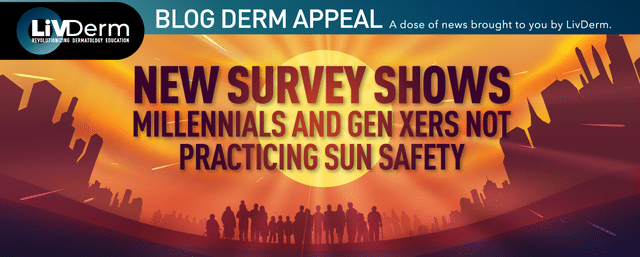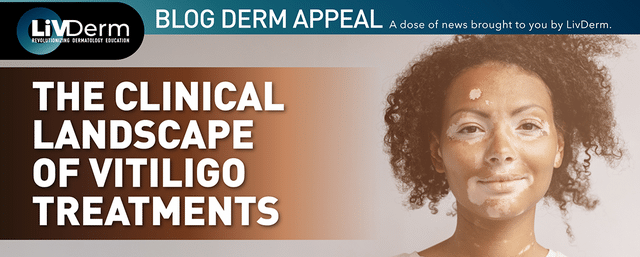The month of May is aptly dedicated to skin cancer awareness and prevention, a topic brought to mind as we excitedly welcome the approaching, warm summer months, with plenty of time spent outdoors. For dermatologists and other health care professionals, it is the prime opportunity to educate patients on the importance of sun protection and to encourage them to book their all-important skin cancer screening appointments.
This last point is of particular significance seeing as a recent study demonstrated that only 25% of millennials and Gen Xers were very likely to get skin cancer screening if they don’t see any notable changes on their skin.
Millennials and Gen Xers on Sun Safety and Skin Cancer Knowledge
The study being referred to here is one conducted by Onepoll on behalf of DermTech, which surveyed 1,000 millennials (ages 26-41) and 1,000 Gen Xers (ages 42-57) on sun safety habits and skin cancer. Results from this survey have demonstrated that these particular age groups lack proper education and healthy habits when it comes to the topic of skin cancer and sun protection. In fact, the data shows that despite 75% of respondents stating they were mindful of sun exposure, some of the accompanying statistics do not align with their behaviors.
Only 19% of the surveyed respondents stated that they use sunscreen year-round, with 78% admitting to going outside on a sunny day without sunscreen, a hat (72%), or ultraviolet (UV) protective glasses (70%). Furthermore, 35% of respondents have used tanning beds, which a recent study has linked to the development of multiple primary melanomas. In addition, 22% of millennials falsely believe that tanning beds are safer than outdoor tanning, compared to only 11% of Gen Xers.
Of the total respondents, 24% stated that they always or often wore sunscreen as teenagers, with one in five having never worn sunscreen in their teen years. Additionally, almost 30% of Gen Xers state that they never wear sunscreen.
Skin Cancer Awareness
Many of the survey’s respondents admitted they did not know much about skin cancer, with only 44% feeling knowledgeable about skin cancer of any kind. An even lower number of respondents felt knowledgeable about nonmelanoma skin cancers. Only 16% felt knowledgeable about basal cell carcinoma, 14% about squamous cell carcinoma, and a mere 10% of respondents were informed about actinic keratosis.
A total of 36% of respondents knew that an open sore that was slow to heal could possibly be skin cancer and only 37% of millennials and 45% of Gen Xers thought that prolonged sun exposure could lead to precancerous lesions.
That being said, there is also evidence to suggest that knowledge on the topic may be increasing. For example, a total of 76% of respondents knew that darker skin could also get skin cancer, and 75% were aware that UV rays can cause damage even on cloudy days.
What Does This Mean?
Despite the resources available, many people are still unaware of some of the dangers caused by overexposure to the sun. More than that, they are unsure of the topic of skin cancer in general and how to properly recognize symptoms and concerns.
According to Elizabeth K. Hale, MD, board-certified dermatologist and clinical associate professor of dermatology at the New York University Langone Medical Center, “This survey shows there is a lot of room for education when it comes to nonmelanoma skin cancer (NMSC). The good news is that millennials and Gen Xers are concerned about how much sun they are getting, but they still aren’t following key steps to ensure they protect their skin, such as wearing sunscreen year-round and remembering to put sunscreen on all areas that are exposed to the sun. In fact, according to the survey, a majority missed applying sunscreen to key exposed areas, such as ears (25%), lips (14%), and scalp/hairline (13%). Applying adequate sunscreen to these areas can help cut their risk of NMSC.”
Loren Clarke, MD, board-certified pathologist and dermatopathologist, and chief medical officer of DermTech adds, “While respondents are aware of the different types of skin cancer, including basal and squamous cell carcinomas, respondents acknowledge that they aren’t as informed as they would like. As nonmelanoma skin cancer is one of the most common types of skin cancer, it is imperative that we build awareness of what skin cancers look like and how to prevent them.”
Educating Patients
Arming patients with the information they need to make smart decisions about their sun habits is not always easy. As the survey demonstrates, many individuals will not even think about skin cancer screening unless they have reason to. It is, therefore, necessary to find ways to reach your patients about the risks of sun overexposure, protective steps they need to take, as well as information surrounding skin cancer itself, in new and impactful ways.
- Give them the stats. Showing real-life data is probably one of the most effective ways to bring awareness and communicate the dangers.
- Provide expert tips for protection and prevention, even going so far as to suggest specific types of sunscreen. Sometimes patients are more likely to buy a product specifically recommended by their dermatologist. This takes away some of the research they need to do and makes things easier for them.
- Have a simple conversation. Even a short conversation during a regular consultation can go a long way, especially if accompanied by material they can take away with them.
And while it is helpful to have easy-to-find resources available to your patients, it may also be beneficial to tailor your approach to your patients. According to Sara M. Wilchowski, DMSc, PA-C, specific populations may not be interested in hearing about the risk of skin cancer. Yet, you may be able to capture their attention by bringing up wrinkles, lentigo, or pigmentation. It may be the case that some people are overly sensitive or concerned about their physical appearance, therefore driving them to take more immediate action concerning their sun habits if it has to do with how they look.
Concluding Thoughts
When presented with the results of this survey, coupled with the fact that nonmelanoma skin cancer is one of the most common types of skin cancer, it is clear that further education is necessary. One important aspect that needs to be understood by people is that exposure to ultraviolet light, from the sun and indoor tanning devices, is the most preventable risk factor for skin cancer.
- https://www.businesswire.com/news/home/20230405005007/en/New-Survey-Finds-Millennials-and-Gen-Xers-Not-Following-Safe-Sun-Habits-Increasing-Risk-of-Nonmelanoma-Skin-Cancer
- https://sunregrets.luminatedna.com/sun-myths/
- https://www.dermatologytimes.com/view/millennials-gen-xers-increase-risk-of-nonmelanoma-skin-cancer
- https://www.dermatologytimes.com/view/sara-s-skin-security-arm-them-with-knowledge
- https://www.dermatologytimes.com/view/indoor-tanning-and-melanoma
















